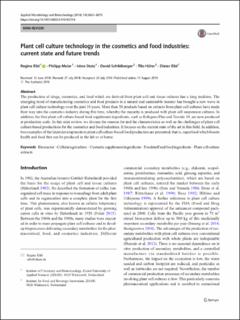Please use this identifier to cite or link to this item:
https://doi.org/10.21256/zhaw-3136| Publication type: | Article in scientific journal |
| Type of review: | Peer review (publication) |
| Title: | Plant cell culture technology in the cosmetics and food industries : current state and future trends |
| Authors: | Eibl-Schindler, Regine Meier, Philipp Stutz, Irène Kathrin Schildberger, David Hühn, Tilo Eibl, Dieter |
| et. al: | No |
| DOI: | 10.21256/zhaw-3136 10.1007/s00253-018-9279-8 |
| Published in: | Applied Microbiology and Biotechnology |
| Volume(Issue): | 102 |
| Issue: | 20 |
| Page(s): | 8661 |
| Pages to: | 8675 |
| Issue Date: | 2018 |
| Publisher / Ed. Institution: | Springer |
| ISSN: | 0175-7598 1432-0614 |
| Language: | English |
| Subjects: | Bioreactor; Cellular agriculture; Cosmetic supplement ingredient; Foodstuff and food ingredient; Plant cell culture extract; Cell culture technique; Cosmetics; Dietary supplement; Food industry; Plant cell |
| Subject (DDC): | 660.6: Biotechnology |
| Abstract: | The production of drugs, cosmetics, and food which are derived from plant cell and tissue cultures has a long tradition. The emerging trend of manufacturing cosmetics and food products in a natural and sustainable manner has brought a new wave in plant cell culture technology over the past 10 years. More than 50 products based on extracts from plant cell cultures have made their way into the cosmetics industry during this time, whereby the majority is produced with plant cell suspension cultures. In addition, the first plant cell culture-based food supplement ingredients, such as Echigena Plus and Teoside 10, are now produced at production scale. In this mini review, we discuss the reasons for and the characteristics as well as the challenges of plant cell culture-based productions for the cosmetics and food industries. It focuses on the current state of the art in this field. In addition, two examples of the latest developments in plant cell culture-based food production are presented, that is, superfood which boosts health and food that can be produced in the lab or at home. |
| URI: | https://digitalcollection.zhaw.ch/handle/11475/17744 |
| Fulltext version: | Published version |
| License (according to publishing contract): | CC BY 4.0: Attribution 4.0 International |
| Departement: | Life Sciences and Facility Management |
| Organisational Unit: | Institute of Chemistry and Biotechnology (ICBT) |
| Appears in collections: | Publikationen Life Sciences und Facility Management |
Files in This Item:
| File | Description | Size | Format | |
|---|---|---|---|---|
| Eibl2018_Article_PlantCellCultureTechnologyInTh.pdf | 2.12 MB | Adobe PDF |  View/Open |
Show full item record
Eibl-Schindler, R., Meier, P., Stutz, I. K., Schildberger, D., Hühn, T., & Eibl, D. (2018). Plant cell culture technology in the cosmetics and food industries : current state and future trends. Applied Microbiology and Biotechnology, 102(20), 8661–8675. https://doi.org/10.21256/zhaw-3136
Eibl-Schindler, R. et al. (2018) ‘Plant cell culture technology in the cosmetics and food industries : current state and future trends’, Applied Microbiology and Biotechnology, 102(20), pp. 8661–8675. Available at: https://doi.org/10.21256/zhaw-3136.
R. Eibl-Schindler, P. Meier, I. K. Stutz, D. Schildberger, T. Hühn, and D. Eibl, “Plant cell culture technology in the cosmetics and food industries : current state and future trends,” Applied Microbiology and Biotechnology, vol. 102, no. 20, pp. 8661–8675, 2018, doi: 10.21256/zhaw-3136.
EIBL-SCHINDLER, Regine, Philipp MEIER, Irène Kathrin STUTZ, David SCHILDBERGER, Tilo HÜHN und Dieter EIBL, 2018. Plant cell culture technology in the cosmetics and food industries : current state and future trends. Applied Microbiology and Biotechnology. 2018. Bd. 102, Nr. 20, S. 8661–8675. DOI 10.21256/zhaw-3136
Eibl-Schindler, Regine, Philipp Meier, Irène Kathrin Stutz, David Schildberger, Tilo Hühn, and Dieter Eibl. 2018. “Plant Cell Culture Technology in the Cosmetics and Food Industries : Current State and Future Trends.” Applied Microbiology and Biotechnology 102 (20): 8661–75. https://doi.org/10.21256/zhaw-3136.
Eibl-Schindler, Regine, et al. “Plant Cell Culture Technology in the Cosmetics and Food Industries : Current State and Future Trends.” Applied Microbiology and Biotechnology, vol. 102, no. 20, 2018, pp. 8661–75, https://doi.org/10.21256/zhaw-3136.
Items in DSpace are protected by copyright, with all rights reserved, unless otherwise indicated.